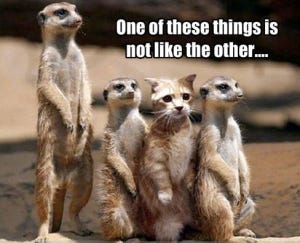Remove every single word that doesn’t belong
Unorganized pieces of information will only confuse your target, and make it harder for them to decide whether to cover you.
Thanks for reading Pitches Get Stitches. I’m Jake. My company, Opinioned, helps leaders publish op-eds in top-tier media. I previously built and edited the opinion section at Fortune.
In this newsletter, I dissect reader-submitted op-ed pitches from the perspective of an op-ed editor. I try to not only point out flaws, but highlight common themes I’ve noticed over my career evaluating pitches and helping clients construct their own.
I would love if you submitted a pitch for me to review. It can be something you’re actively working on or hypothetical—all are welcome.
If you have a pitch, reply to this email or send it to jake@getopinioned.com. If I select it, I’ll omit any identifying information and evaluate it in this newsletter—at no cost.
(Other Types of) Pitches Get Stitches
I’m experimenting.
From the start of Pitches Get Stitches, I’ve focused only on evaluating op-ed pitches. But I received a different kind of pitch the other day, one asking a news outlet if they wanted to interview their CEO client.
Since these are the more standard type of media pitches, I thought it would be educational to evaluate this one in my newsletter.
There are plenty of lessons to glean from the following pitch. The central theme, to me, is that too much information can ruin a pitch.
Ideally, your pitch should be a crescendo. You can’t immediately start with trumpeting what’s most interesting about your client. You have to open with some context about your client, so that their unique perspective fits into a larger narrative.
Today’s pitch contains a few reasons why the journalist might want to interview the CEO. But it doesn’t build up to them. Instead, it offers a mishmash of facts about the leader that don’t appear to have any coherent theme.
Below, I lay out the problems I see and how I’d do it differently.
Pitch
SL: From Pianist to Femtech CEO of the Fastest-Growing Startup in the US
Hi [Name],
I am excited to offer you an exclusive interview with [Name], the CEO and co-founder of [Company], a hormonal health company. With a customer base of 92,000 customers, [Company] has recently been named one of the fastest-growing companies in America by Inc. 5000.
But before becoming a female CEO of a fast-growing business, [Name] was a professional pianist!
[Name] began playing the piano at 4 and even got her musical degree in China. However, during her teenage years, [she] became passionate about science and dedicated all her free time to studying maths and theoretical physics to prepare for university admission. Despite many obstacles, [Name] entered Columbia University and got a biomedical engineering degree.
Finally, in 2019, [Name] founded [Company], a fertility tracker to provide clarity and calmness for couples trying to conceive. Today, [Company] has evolved into a comprehensive at-home solution, allowing individuals to continuously track their fertility hormones from the comfort of their bathroom.
I believe this story of following one's true passion and taking ownership of one's life will be an inspiring read for female founders and women in business in light of International Women's Day.
During the interview, [Name] would be happy to share her thoughts and insights on:
The role of femtech companies in advancing women's healthcare and predictions for the industry's future;
Growing a successful at-home testing startup and making it thrive by increasing the startup's revenue by 1,323% over the last 3 years despite inflationary pressure, rising capital costs, and hiring challenges;
Raising $6 million from investors despite women's health being an overlooked niche;
The importance of supporting mental health for CEOs.
So, if you're interested in an interview with [Name], I'll gladly arrange that.
What do you say?
Best
[Name]
[Company] PR Team
Stitches
SL: From Pianist to Femtech CEO of the Fastest-Growing Startup in the US
I am excited to offer you an exclusive interview with [Name], the CEO and co-founder of [Company], a hormonal health company. With a customer base of 92,000 customers, [Company] has recently been named one of the fastest-growing companies in America by Inc. 5000.
“You wouldn't believe that this CEO was originally X!”
This is a common trope in pitching; the pitcher thinks presenting the journalist with a quirky fact about their client will make them more interesting. Maybe that works if the CEO used to be a circus clown and decided on a career change after getting jolted by their hand-buzzer.
But a pianist? That’s doesn’t grab my attention.
The subject line also says this company is “the Fastest-Growing Startup in the US.” Yet, when you look at the first paragraph of the pitch, the company was named “one of the fastest-growing companies in America by Inc. 5000.”
I checked this company on Inc. It’s on the list, but it’s not at the top. Unless I’m missing something, there’s no evidence that this company is the fastest-growing startup in the country. Exaggerations like this are a major faux pas, and look quite bad if the journalist discovers them.
And even if that fact is true and I’ve missed something, then the pitcher should have clearly presented that evidence to prevent any confusion.
If they’re not the fastest-growing startup, then the fact that they are simply “fast-growing” isn’t much of a hook. Companies that can be described that way are a dime a dozen.
Also, if you’re going to include a big number in your pitch like “92,000,” you have to put some context around it. Otherwise, I have no idea how impressive that figure is.
But before becoming a female CEO of a fast-growing business, [Name] was a professional pianist!
[Name] began playing the piano at 4 and even got her musical degree in China. However, during her teenage years, [she] became passionate about science and dedicated all her free time to studying maths and theoretical physics to prepare for university admission. Despite many obstacles, [Name] entered Columbia University and got a biomedical engineering degree.
If you want to discuss the CEO’s transition from music to other subjects in her teenage years, then you need to explain why she made that transition. Otherwise, I don’t learn anything from the information. Information for information’s sake is not useful.
Next, the pitcher mentions “obstacles” their client faced before going to Columbia. I want to know what those obstacles are. Just telling me they faced obstacles, again, doesn’t tell me much.
Another issue: If it turns out that the client simply played the piano in high school, I’d be annoyed. That’s not the same as a “professional” pianist.
But let’s play along. Maybe she was a professional pianist who got her musical degree in China, and then transitioned to other interests in her teenage years. This leaves me with a bunch of questions. So she was a professional pianist before she was a teenager? Even if that was true—maybe she was a virtuoso—now I’m wondering about that. If she was so good at piano, why’d she drop it?
The problem here is not with any inconsistencies in the executive’s background. It’s that I’m left with a lot of unanswered questions, and as a result a negative impression of the pitch. If there’s any information in your pitch that might need further explanation, either cut it out entirely or make sure you give enough explanation so that the recipient isn’t confused.
I hate to rag on the piano all this time, but there’s another issue here I want to highlight. This piano anecdote has nothing to do with the central thrust of the pitch. If you skip ahead, you’ll see that the pitcher is positioning their client as a successful CEO who can speak authoritatively about building and scaling a femtech company.
Great. But if that’s what you want the journalist to focus on, then why are you talking about her musical background?
It’s important to always keep your goal top of mind. If you want a reporter to speak to your client because they’re a dynamic tech CEO, then all of your pitch should be devoted to why they’re a dynamic tech CEO. All other words are a waste.
Finally, in 2019, [Name] founded [Company], a fertility tracker to provide clarity and calmness for couples trying to conceive. Today, [Company] has evolved into a comprehensive at-home solution, allowing individuals to continuously track their fertility hormones from the comfort of their bathroom.
How exactly did this company evolve? The first sentence says the company is a fertility tracker, and the second sentence essentially says the same thing. If the company evolved between its founding and today, it’s not stated here.
“Evolve” has a very specific meaning. Don’t use a word like that simply because it sounds impressive. Use it only if it conveys its specific meaning.
I believe this story of following one's true passion and taking ownership of one's life will be an inspiring read for female founders and women in business in light of International Women's Day.
The same thing happens in the following paragraph, where the pitcher writes that the executive followed her “true passion” and took “ownership” of her life.
Nothing has been previously written in this piece about the leader having a passion for fertility tracking. How are we supposed to assume this company is an expression of her true passion without knowing anything about her passion? And what does the pitcher mean by taking “ownership” of one’s life? Is that a reference to starting your own business? Is this a theme that’s going to be further explored?
There’s so much being thrown in the direction of the journalist. I don’t know how they could decide what to pick.
Your objective shouldn’t be to offer a tapas platter. It should be to offer one, maybe two or three, main courses. Further to that point: the mention of International Women's Day. Hitherto, this pitch hasn’t mentioned women at work or female leadership, outside of mentioning the client is a femtech CEO. Is that a new focus they intend to introduce? Or is it just more information?
I’d also caution against pegging the pitch to International Women’s Day. Many female CEOs have their teams pitching them during major events like this. If you don’t have a perspective that markedly stands out from others’, it’s going to be difficult to secure coverage.
During the interview, [Name] would be happy to share her thoughts and insights on:
The role of femtech companies in advancing women's healthcare and predictions for the industry's future;
Growing a successful at-home testing startup and making it thrive by increasing the startup's revenue by 1,323% over the last 3 years despite inflationary pressure, rising capital costs, and hiring challenges;
Raising $6 million from investors despite women's health being an overlooked niche;
The importance of supporting mental health for CEOs.
These bullets are laid out in a simple format and it’s easy to understand the main themes. That’s good.
But yes, there’s a problem: None of the pitch built up to this point. So when presented this late in the email, they feel abrupt, emerging as if out of nowhere.
Also, try to look at these four points from the perspective of a journalist. Is there anything there you haven’t read before? I’ve seen all these themes in different formats many times, even if the exact numbers or industries were different.
I’m sure the expert can speak authoritatively on all of these issues. But simply having authority isn’t enough to break through in competitive media. You need something that sets you apart—and I don’t see that.









